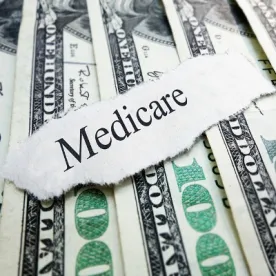President Biden and House Speaker Kevin McCarthy are scheduled to meet one-on-one today, just 10 days ahead of the June 1 debt limit deadline.
As a refresher, the debt limit is the total amount of money that the US government is authorized by Congress to borrow to meet its existing legal obligations. Because the federal government is currently spending more than it brings in (and has been in deficit for almost 25 years), failure to lift the debt limit ceiling would force the federal government to halt borrowing, and it could only finance expenses with funds it has available.
As the Bipartisan Policy Center points out, once the US Department of the Treasury has exhausted its emergency borrowing authority (i.e., hit the debt limit), only two sources will remain from which to continue funding government operations: cash on hand and daily cash inflows. In other words, the government will still have spending authority, and it will have money to spend, just not as much as it needs, because it won’t have permission to spend more than it has.
With little time left for negotiations, understanding the implications of breaching the debt limit becomes a priority. Breaching the debt limit is not the same as having a government shutdown. If the debt limit is reached, the Treasury Department would likely consider prioritizing paying certain bills and delaying payments to others—generating stakeholder concerns about which programs or services may be at risk. Experts warn that Medicare and Medicaid payments to providers and managed care companies might be delayed, as is possible for public health programs, such as those addressing the opioid and maternal health crises. Unless or until Treasury Secretary Yellen provides more information on the department’s plans, all ideas on potential responses and repercussions of reaching the debt limit are speculative.
The Senate is in recess this week unless they are called back for a debt limit vote. On Tuesday, the House Committee on Oversight and Accountability will hold a hearing on the role of pharmacy benefit managers (PBMs), placing PBMs in the congressional hot seat for the third time in as many weeks. Last week, the House Energy and Commerce Health Subcommittee completed a markup of healthcare-related bills, and this week (potentially Wednesday) the full Energy and Commerce Committee is expected to continue that work. As a reminder, the subcommittee combined 11 bills into one broad package that included transparency provisions; extensions of key programs, financed through use of the Medicaid Improvement Fund; and a site-neutral policy impacting physician-administered drugs. The subcommittee separately considered bills on the animal drug user fees and organ transplants. All of those bills passed the subcommittee with full bipartisan support




 />i
/>i

